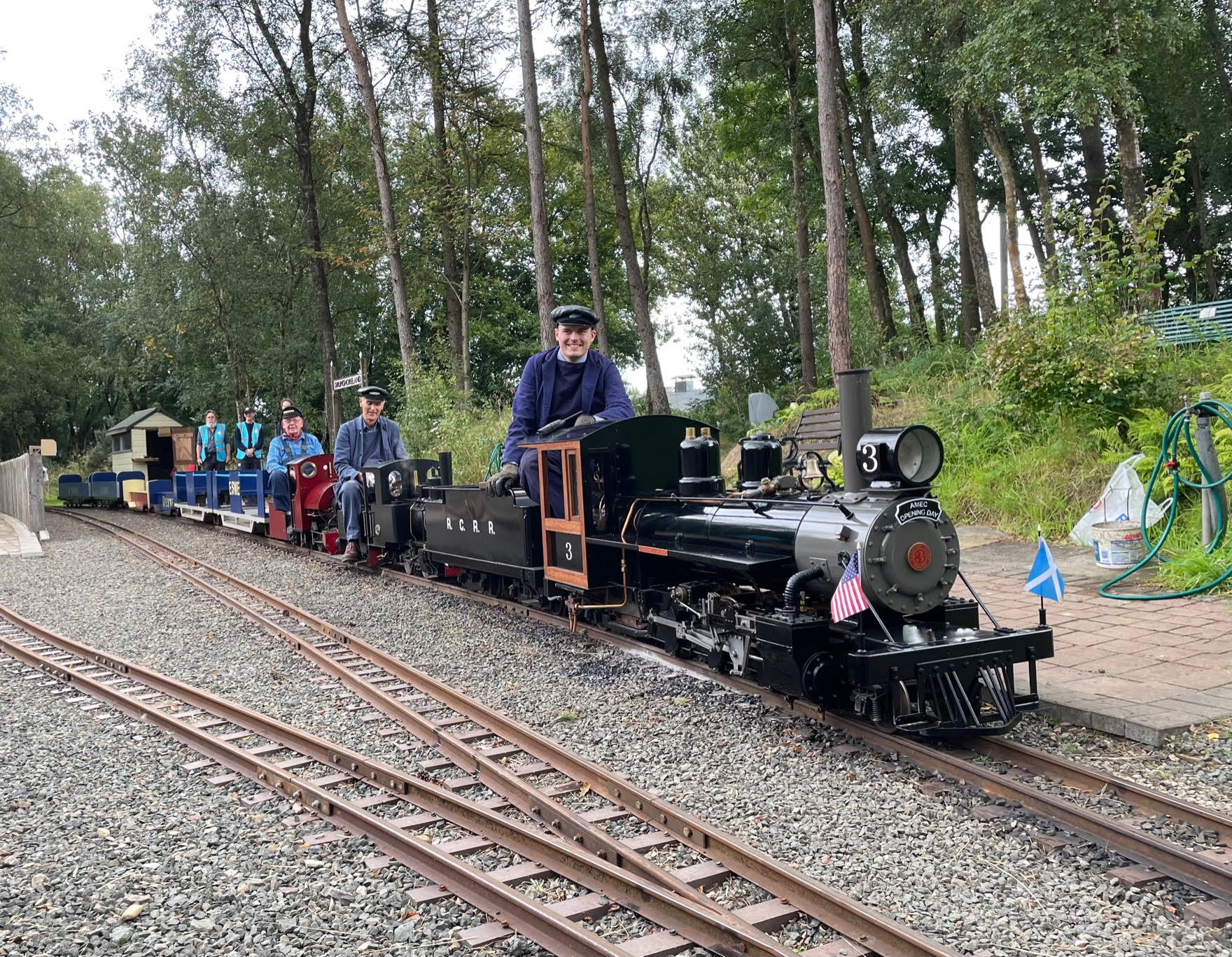If you are a Paddle Steamer fan, (which I know our Secretary is one) then you will be aware of the few that have been saved for posterity. In scotland we have the ‘Waverley‘ currently in commission & the ‘Maid of the Loch‘ currently well on her way to full restoration. But what of the ones that got away and have long gone to the scrapyard? One such vessel was the PS ‘Jeanie Deans‘. Efforts were made to save her by transferring her to the River Thames for conversion into a floating restaurant, but as so often happens it didn’t end well.
Probably unknown to the majority of our members, is the interesting story from member Arthur Blue when at short notice on the 5th November 1965, he was involved in her transfer voyage to the River Thames. Unfortunately, there are no photographs to accompany the story, but in his own words and for posterity, here is the tale of an eventful voyage:
From our window above Port Glasgow, I had watched river steamers being hauled out on Lamont’s patent slip, and as soon as the normal services resumed after the war I had spent school holiday weeks on the water with an ” any pier to any pier ” runabout ticket.
So, when someone came into the Watt School, where I was studying for my Chief’s ticket, and asked if any of us knew the vessel I naturally answered ‘Yes’. ‘Would I like a trip to the Thames on her?’
Yes again, and when was this likely to be?
‘She’s at Customhouse Quay with steam up’ … was the answer … ‘and if you can get on board right away it would be great’.
So, I went straight home, stuffed a boiler suit … I wasn’t that naive … and a change of underwear into a bag, went down to the quay, and proceeded on board.
It turned out that the Chief had suddenly been taken ill, just before sailing, and that it was hoped that I would be his replacement. I hadn’t sailed as Chief before, but I had been in steam under the watchful tutelage of “Auld McBain” … possibly the world’s oldest serving engineer. Mr McBain had a parchment ticket and had started at sea in a sailing ship sometime in the 1890s, a Peterhead whaler with auxiliary power. I thought that I could manage the job, so when the telegraph began to ring increasingly insistently, I carefully pushed the big lever forward, and off we went.
All went well for a short time, and I was beginning to relax when the feed pump stopped. While the usual methods, approved and otherwise, were being used to coax it back into life again the hot well was merrily overflowing into the bilge, but our primary focus of attention was however the damned feed pump. With this eventually back in service I remarked to the fireman that he could give her a good dose of extra feed, to be met by the reply that the reserve feed tank was now nearly empty.
Oh dear! Weight was always a big consideration on the river steamers, especially on the Craigendoran boats with their severe draught restrictions, so the fresh-water tanks were as small as they could get away with, not a problem where there were several opportunities each day to top up. But we were bound for Holyhead, rather than Rothesay. A consultation with the Master resulted in a decision to call at Stranraer, where I think he had some old acquaintances on the Railway Pier, for water. I then had a belated lunch which turned out to be a tinned Fray Bentos steak pie.
Later that evening we duly topped up every available receptacle with BR Stranraer water and resumed our progress southwards into darkness and rapidly deteriorating weather. I had some experience of the Irish Sea and its weather, and in ASN’s Bardic Ferry had once taken four days to get from Larne to Preston, but the night with the Jeanie is one I won’t ever forget.
The seas got steadily bigger, and we went steadily slower, easing her along while a succession of crew members appeared around the engine room rails, presumably praying that the job would keep going. Some were even carrying lifejackets. But the cranks kept turning, and old boat kept going, rising reassuringly buoyant to every sea. At one point, in the greying light of a stormy dawn, I went aft to see how the steering gear was doing, whereupon a scene of devastation met my eyes when I opened the hatch and looked down. Various spare ropes and cans of oil had been stowed in the compartment, these had broken free and were now sliding back and forth in an oily tangle. Looking forward along the deck I could see the smoke streaming from the funnels, to be immediately beaten down to the sea surface and whipped away downwind, while unending ranks of large, white-topped seas marched towards us from the west. Back down at the control platform, I thought, was a much cosier place to be.
The next thing … rudely interrupting my breakfast of another tinned pie … was a loud explosion from the area of the starboard paddle box. Was the Irish Navy firing on us? The noise turned out to have been the disintegration of a toilet bowl, cause by the sea hammering up into the u-bend, and shortly afterward another one went off in a similar shower of fragments. This discouraged the crew’s use of the facilities, which was a good thing, because in due course the whole floor of the gents toilets, rusted by the aftermath of ‘visits to the engines’ over forty years, fell away into the sea leaving what was quite a useful straight-drop lavatory, once the weather had moderated.
In due course we reached shelter in Ramsey Bay, but as the fuel was getting low, after a while had to resume our passage towards Holyhead where fresh bunkers had been ordered. Water was less of a worry as I was now prepared to use saltwater feed in an emergency, though hopefully not.
The Mate, who had been an aviator in his other life, reckoned that we ought to sight Holyhead Mountain before dark, but as dusk descended in rather poor visibility there was no sign of land, and meanwhile the bob of the sounding tape was making clanging noises on the bottom of the bunker tanks. We reduced speed to the minimum and carried on in darkness, eventually creeping into the berth on the last flickers of flame from the burners and the water below the bottom nut, with a big sigh of relief when we found a bunkering truck and a water hose waiting for us.
In celebration of our unexpected survival the cook then served … Ta Ra! … steak pies, and a peaceful night was then spent alongside.
Came the dawn and we steamed off once more, hoping to reach Falmouth next stop, but when about halfway across Cardigan Bay there came a very loud and alarming noise of something loose around the starboard paddle, so we stopped the engine and opened the door to have a look, while the ship rolled gently in the swell. It turned out that a trunnion had fractured at the eye, and the float was now hanging loose from the other end, only prevented from flailing everything to bits by still having the radius rod attached. Well, you can go quite well with a float missing, so my mate and I climbed into the box to clear things away, and if possible, salvage the float for further use. Faces at the door watched us doing this job and were highly entertained when the wheel took a slow half-turn, and we climbed like monkeys to escape a bath. Though we had indeed ensured that the throttle was shut, the drains open, and the gear in mid position we had, of course, forgotten to put the turning gear in!
Anyway, we did manage to release the float and even recover it on to the deck, and also removed the radius rod … it was a good job that it wasn’t the driving one. Off again in quite reasonable weather conditions, and round Land’s End without any difficulties. Falmouth was another matter.
While our Skipper was an old paddle steamer hand the Falmouth dock pilot had no idea that such craft handle very differently from screw vessels, so when things went silent after a confusing series of telegraph orders I looked out to find us jammed diagonally across a corner of the dock, out of which we had to warp ourselves clear. More fuel and water, possibly some fresh milk, but we were away again before there was a chance to barter some of our tinned pies for Cornish pasties. Next stop Southampton, for a top-up of the bunkers before the final dash through the Dover Strait and round to Sheerness (we were beginning to think like those in charge of the Scharnhorst!).
Berthing bow-in at a bunkering jetty somewhere near Southampton, the anchor had been laid to assist swinging the vessel for her departure, so when the hoses had been disconnected and the ropes let go the windlass was started to heave in the chain. Which didn’t come easily … and moreover an offlying bunker barge was starting to move towards us … our anchor was afoul of the barge’s ground moorings. It was only with great effort that we managed to lift the tangle far enough to confirm the problem, whereupon it was easy enough to climb down and hang the offending wire off, before slacking our own cable away and releasing the anchor. I don’t know who saw us at this … I don’t think that there was a pilot on board as our Master, who was from Cosens … may have held an exemption, but in any case, we no longer cared.
In the event we passed Dover with great aplomb, giving her an extra notch just to show the locals what a proper steamer could do. They once had some splendid paddlers at Dover, but these were long gone, and ignorance had descended on the place. Round the Forelands and just approaching the Medway when there was a hiss from below my feet and the engine room filled with steam. Damn! However, it was just an indicator cock which had slackened off and this was quickly fixed, so we steamed up to Sheerness to a welcoming committee and a long-awaited FWE. The cook said that there were still enough Fray Bentos pies for everyone but I think that I went ashore for fish and chips
…………………………
Note. This all took place fifty six years ago and I must confess that I can’t remember any names or faces from the trip, though the events remain quite clear. And looking back I must give credit to the other engineer, and particularly to the heroes in the boiler room, without whom we would quickly have come to a standstill. Also, the cook, likewise. And I was sorry to hear of the difficulties which were encountered subsequently, when the ship had become the ‘Queen of the South’. It would been good to have saved her.
If you would like to read more about the voyage & to view some photographs, the Paddle Steamer Preservation Society have a series of articles titled ‘Megoran’s Musings‘ which would be worth further reading.

